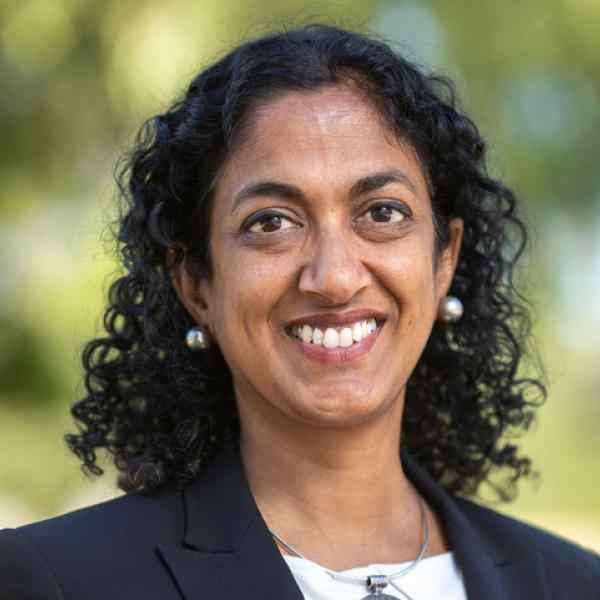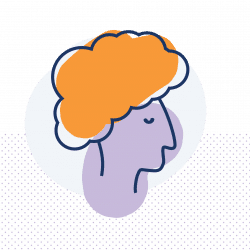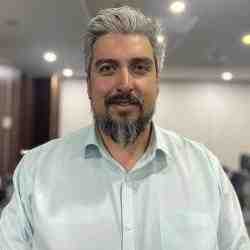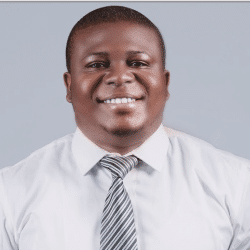Wprowadzenie
Meena Palaniappan has created a community-based emergency response platform that empowers vulnerable communities to be local changemakers.
Nowy pomysł
Meena realizes that the world has not focused enough on amplifying voices and unlocking the power in vulnerable communities to be resilient in disasters and emergencies. With a core belief in the value of “neighbors helping neighbors,” Meena envisions a world where neighbors can prepare for disasters, improve access to basic needs and overcome chronic challenges with a platform that empowers them to be changemakers in their communities.
Meena created a mission-driven tech nonprofit called Atma Connect and a community-based emergency response platform called AtmaGo to empower people, especially in vulnerable communities, to be local changemakers who respond early to emergencies and have the confidence and initiative to find collective solutions to their local problems. For the first time, previously neglected communities are gaining their voices and creating collective resources to advocate for and solve problems in their neighborhoods.
Through creative systems of incentives such as gamification, profiling community leaders, and holding contests, AtmaGo has successfully attracted 7 million people to collaborate, exchange know-how, and engage local governments to respond to their needs. In addition, AtmaGo also offers trainings on Citizen Journalism and Digital Literacy to increase the number of women community leaders who have joined the online platform. The result, after nearly five years in Indonesia as the first country of impact, was the creation of a movement and the transformation of neglected millions of marginalized people into visible and proud changemakers who believe in their power and act to change their own lives and communities.
Obsessed since her childhood with how voiceless people are perceived by others and even perceive themselves as invisible, Meena through the AtmaGo online platform provides a way for people to be seen, heard, and respected by their communities and governments as equal citizens. She believes passionately that every person is resourceful and ingenious, and that when we let the people who are the most affected and who are the least heard lead the way, they will lead us to the more connected, equitable, resilient world we’ve been waiting for.
The platform has expanded into other countries of impact such as Puerto Rico in the United States. Globally, Meena aims to reach locations with similar characteristics to Indonesia (high mobile penetration and literacy with high crisis need). Through the AtmaGo platform, hundreds of marginalized communities in Indonesia and Puerto Rico have solved problems of garbage and poor infrastructure, and created resilient plans to face floods and other emergencies. Thanks to users’ input, the platform has expanded to enable people to find information about jobs and events and a forum to discuss a broad range of topics as a community. It also allows people to report the social issues around them and engage with the local government to respond. AtmaGo has reached hundreds of communities throughout Indonesia, with over a million peer-to-peer information exchanges on critical issues of water, flood, jobs, education, shelter, earthquake, crime and fires.
The impact of AtmaGo shone brightly in October 2018 when the organization shared cutting-edge research conducted by the Centre for Innovation Policy and Governance (CIPG). The research aimed to estimate the potential impact of AtmaGo in improving disaster preparedness and response in Indonesia. The report showed that 79% of users found AtmaGo helpful in connecting them with their community, and 67% of respondents found AtmaGo helpful in assisting them to prepare for disasters. The greatest impact was reported by residents of three disaster-prone areas in Indonesia – Palu, Lombok and Yogyakarta. AtmaGo helped the communities make decisions accurately and efficiently when disaster happened. The platform also enabled communities to take collective action and spread innovative solutions to their neighborhoods quickly. In addition, local governments and the national government ombudsman found AtmaGo very helpful for mapping social issues including disaster risk mitigation in the region.
To respond to the COVID-19 pandemic, Atma Connect launched a new microsite on the AtmaGo platform to raise awareness, provide psychological support via free telecounseling, and help people find critical resources during the pandemic, including vaccination sites. After successfully implementing AtmaGo in Indonesia, Meena launched AtmaGo in Puerto Rico at the end of 2019 and aims to expand globally in the next five years. In the long run, Meena wants to increase changemaking capacity and community cohesion to help everyone thrive in the 21st century.
Problem
Around the globe, disaster-prone countries, such as Indonesia, regularly experience earthquakes, tsunamis, landslides, volcanic eruptions, flooding, and drought, and other huge losses during and after disasters. With climate change, extreme weather events are rapidly increasing in scale and scope, and affecting marginalized communities, and especially women and children, the most. There is an urgent need to reduce the risk of disaster and improve the emergency preparedness in these countries.
People are most likely to survive and recover from disasters and emergencies when there is good social cohesion and where people know and work together with their neighbors. When emergencies happen, people need access to emergency notifications and critical information from trusted sources to take action to survive and help each other in need. Technology, particularly Information and Communication Technologies (ICT), has been identified as one of the key resources to improve emergency management and risk reduction with the broad availability of mobile phones, internet access, and social media. Emergency warning systems through ICT have been proven to save lives and protect property, but unfortunately, studies have shown that these systems rarely reach a country’s poor and vulnerable communities, including women, children, disabilities, elderly persons, and certain members of ethnic minorities. Enabling vulnerable communities to survive and support each other has received little attention in the risk reduction effort. And inadequate measures for the needs of vulnerable communities to act can lead to catastrophic consequences such as large death tolls.
Meanwhile, the number of internet users has grown in Indonesia due to the increasing affordability of smartphones and internet connectivity. Many people use social media to interact with family and friends and stay up to date with the daily news. However, the ease of sharing information has been a double-edged sword. With the massive growth of social media usage, ICT has been used for dominance, enrichment of the few and to gain advantage over others. The social media companies extract data from these users and sell this data commercially. The current social media is also flooded with negative content and advertising-driven algorithms that promote consumerism above all. As a long-term impact and at its worst, social media can promote a new inequality, community disengagement, and social exclusion. And research has shown that Indonesia is considered very vulnerable to online hoaxes. In 2019, following the electoral riots, the government partially restricted access to the most popular social media platforms to prevent and stop the spread of fake news.
Meena realized that the world has not focused enough on amplifying voices and building social cohesion and power among vulnerable communities to be resilient to disaster and emergencies to take collective action. With the value of neighbors helping neighbors, Meena envisions a world where people can prepare for disasters, improve access to basic needs and overcome chronic challenges by building a positive social fabric with their neighbors online and in person.
Strategia
The AtmaGo mobile platform is designed as an antidote to existing social media and used for the good of all. With the combination of a community-based emergency response platform and a community empowerment program, Meena is changing the way neighbors interact and support each other, and how people use technology to be changemakers. AtmaGo has been designed as a trusted, reliable, and local tool for particularly vulnerable communities, especially women, to use it daily. Hence people turn to it when emergencies happen since people are more likely to survive in disasters and address vulnerabilities when they have good social cohesion.
Meena envisions four massive changes to achieve disaster and emergency resilience among vulnerable people: shifting the power to people through a hyper-localized social network; building on-the-ground movements; changing narratives through storytelling; and sparking civic engagement to get everyone involved in social issues.
On the digital side, AtmaGo was launched as a low-bandwidth, free mobile-friendly website and mobile app for Android phones that allows people to read, write and comment on user-generated posts in four categories: report problems, discuss solutions, share events, and find jobs. Users in select locations can receive emergency alerts to help them respond to and recover from floods and other disasters or emergency situations. The user-created posts are associated with a given city and even district or neighborhood and people can get access to real-time information about problems, solutions, and opportunities in their local area.
People use AtmaGo to build social connectedness and mitigate crisis and disasters through early warnings, disaster and crisis mitigation, disaster and crisis preparedness, and disaster and crisis response and recovery. The system is now being used beyond disasters to enable local communities to supercharge the impact of community leaders and community groups through Ruang Komunitas (community rooms). Through this new feature, people can document, share, and aggregate the impact that is collectively accomplished by grassroots communities.
To respond to the recent pandemic, AtmaGo launched a COVID-19 microsite aiming for behavior change as a response to COVID-19 and building support for the community, collecting need assessments, connecting a thousand users, and promoting physical distancing efforts. The platform also enables users to get psychological support via free telecounseling, a crucial service especially with reports of domestic violence increasing during tough economic times.
On the local level, Meena and the team designed and implemented a capacity-building program to train people on Citizen Journalism and Digital Literacy. Empowering women with these key skills have been a priority, and women’s participation in the platform has been increasing from 45% to over 55% in the past year.
Meena gives users both the tools and the skills to amplify their voices to ensure that users build trusted connections and see the real changes in their communities. The team engaged residents called Resilience Ambassadors who volunteer to organize workshops and events and monitor content in surrounding neighborhoods. The AtmaGo platform enables and rewards networking for purpose and social good, not for promotion or for tribalism. AtmaGo is also introducing the role of local ambassadors who can mobilize their communities and monitor the content to prevent hoaxes, advertisements, or non-beneficial content. The AtmaGo team also provides creative incentives, such as gamification, profiles of inspiring community leaders and impact stories, and contests, to engage more users and deepen their engagement.
To reach as many communities as possible, Meena and her team have partnered with diverse funders including Red Cross, Mercy Corps, Qualcomm Wireless Reach, Cisco Foundation, Vodafone Americas Foundation, and Hilton Foundation. Government, international and local CSOs, and individual donors also have endorsed the work of Atma Connect.
Meena’s work at Atma Connect is inspired by the Indonesian idea of Gotong Royong (mutual support — neighbors working together to improve their communities), launching first in Indonesia in 2015 and expanding to Puerto Rico in late 2019. Meena aims to reach billions of people around the world by replicating the model globally in the next few years. In every new location, Meena starts with human-centered design interviews to help determine the feature and growth approach best suited to the community.
Osoba
From an early age, Meena wanted to be a changemaker. As the third daughter in her family Meena experienced feeling invisible, and she was inspired by the powerful idea of empowering previously voiceless people with a voice and a seat at the table. Born and raised in India, before moving to the United States, Meena witnessed firsthand how environmental issues strongly affect the lives of vulnerable communities including women, children, and people of color. In high school, driven by her strong will to be a solution maker, she orchestrated several changemaking experiences such as founding an environmental club to conduct research and increase student awareness about global problems including waste. She also founded an animal rights club after witnessing the suffering of farm animals. A natural leader, she successfully mobilized her teachers and friends in her school to take part in her clubs’ activities. Through all of these events, Meena demonstrated her passion for the interaction of humans and nature. As she grew up, she witnessed how people, especially children, were dying as a result of poor water quality. She decided to study Environmental Engineering to develop and spread solutions to protect people and the planet. Being the only girl in her classes made her realize that men are still disproportionately dominating many sectors, including in the social sector.
After several experiences, including participating in Teach for America and working with several NGOs in India as a consultant on water issues, Meena continued to see the tremendous impact of humans on the environment, and the health impacts of environmental problems. Meena realized the importance of collecting evidence, documenting information, and working with the media to make the invisible visible. Among her accomplishments: she created and wrote the Environment Sustainability Kit as a guideline for people to start a project, engage diverse stakeholders, advocate government for change, and change policy.
Meena worked for more than a decade on environmental justice in the United States. She saw that people who benefited the least from the economic system are often the ones who suffered the most from its side effects, and whose voices weren’t heard in the halls of decision-making. As the adage goes, if you are not at the table, you are on the menu. This is when Meena recognized her second passion – empowering the most vulnerable people by recognizing their ingeniousness and amplifying their connections and power to create a better world. Meena also realized that technology-based solutions alone are not enough if we can’t change people’s hearts, minds and policies.
During her time at the Pacific Institute, Meena worked on many projects on water and sanitation issues in Africa and India. Inspired by the high usage of mobile phones across the country, Meena initiated the Water SMS program supported by USAID and implemented it in Indonesia. Starting in two cities, Malang and Makasaar, Meena reached 2,000 people in Indonesia in three years. Meena witnessed firsthand how Indonesian communities were keen to share other valuable information. This realization inspired her to launch AtmaGo in 2015 to initially enable communities to share information about water prices with their neighbors. It rapidly became used to organize around chronic flooding or other emergencies in Jakarta. Through a Human-Centered Design (HCD) approach, Meena and her team in Indonesia worked to understand social problems in vulnerable communities and started to iterate the platform based on these needs to overcome daily challenges. Soon after, the foundation was officially established in Indonesia under the name Yayasan Saka Warga to locally operate and build partnerships with the government and other partners.
Through her innovations, Meena and Atma Connect have won many awards including the Tech for Good Award, IDEO Amplify Urban Resilience, Climate Braintrust, and Global Resilience Innovation Award. She is also active in publishing research on climate change and urbanization.




